Orientation for Success in Higher Education: Essay on Reflection
VerifiedAdded on 2023/06/08
|8
|1813
|344
Essay
AI Summary
This essay delves into the significance of reflective learning within the context of higher education, emphasizing the critical role it plays in fostering academic success. It explores reflective approaches, such as the Gibbs reflective cycle, and highlights the importance of feedback and feedforward in improving both formative and summative assessments. The essay examines how students can leverage reflective practices to analyze their experiences, identify areas for improvement, and develop strategies for enhanced performance. It also discusses the impact of feedback from educators in shaping student learning, boosting motivation, and providing direction for future academic endeavors. Furthermore, the essay covers the distinction between formative and summative assessments and how these are used to evaluate student learning and progress. The essay concludes by underscoring the value of reflective learning and the effective utilization of feedback and assessment to achieve academic goals.
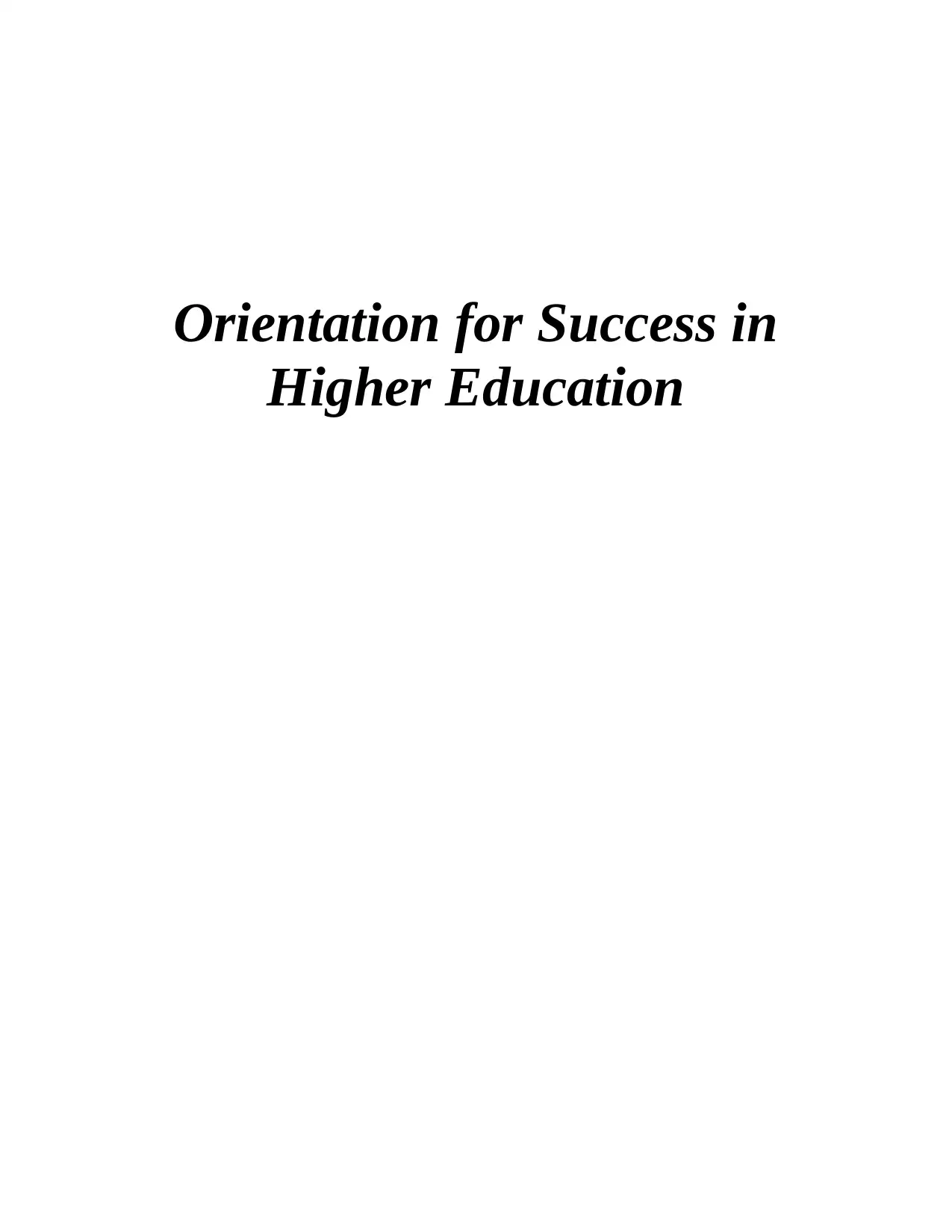
Orientation for Success in
Higher Education
Higher Education
Paraphrase This Document
Need a fresh take? Get an instant paraphrase of this document with our AI Paraphraser
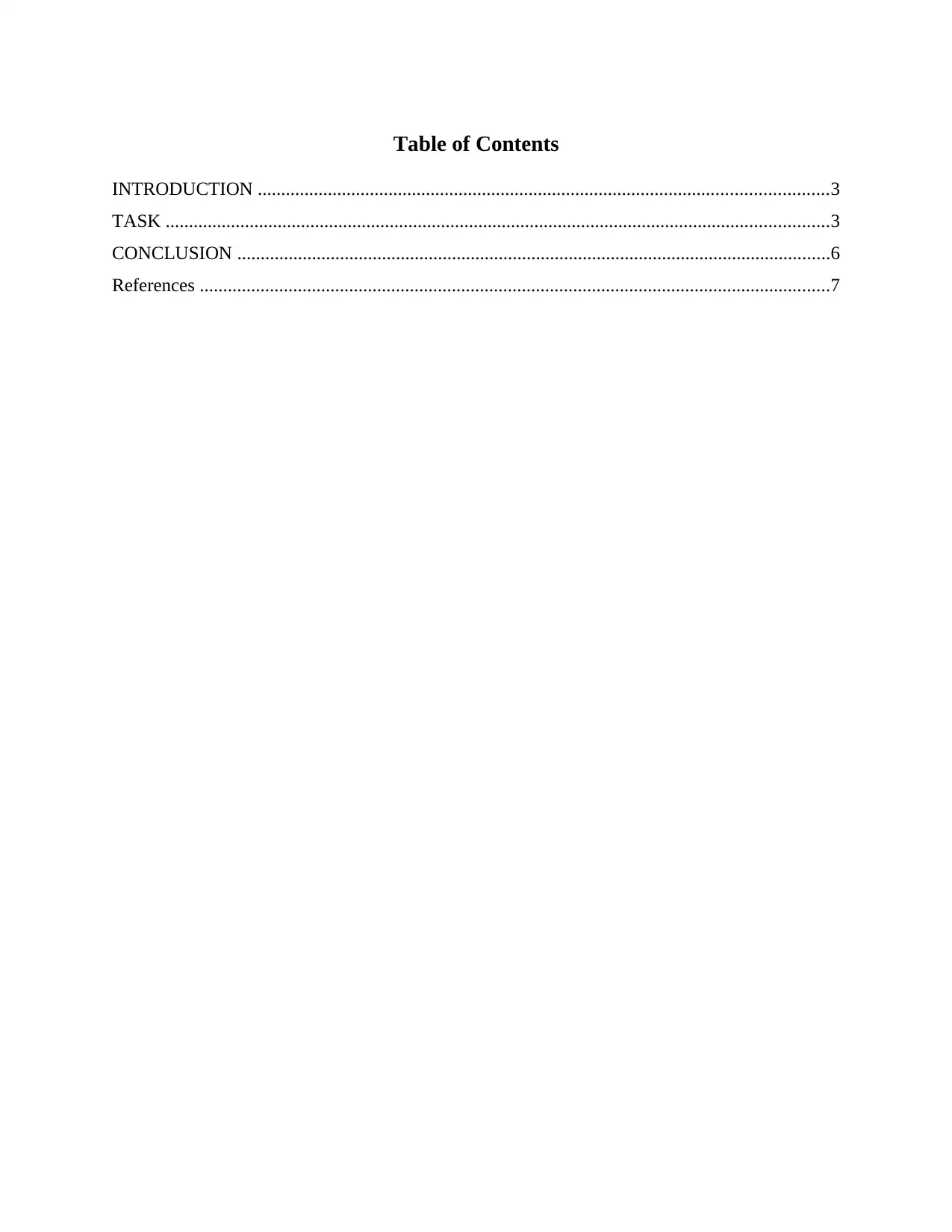
Table of Contents
INTRODUCTION ..........................................................................................................................3
TASK ..............................................................................................................................................3
CONCLUSION ...............................................................................................................................6
References .......................................................................................................................................7
INTRODUCTION ..........................................................................................................................3
TASK ..............................................................................................................................................3
CONCLUSION ...............................................................................................................................6
References .......................................................................................................................................7
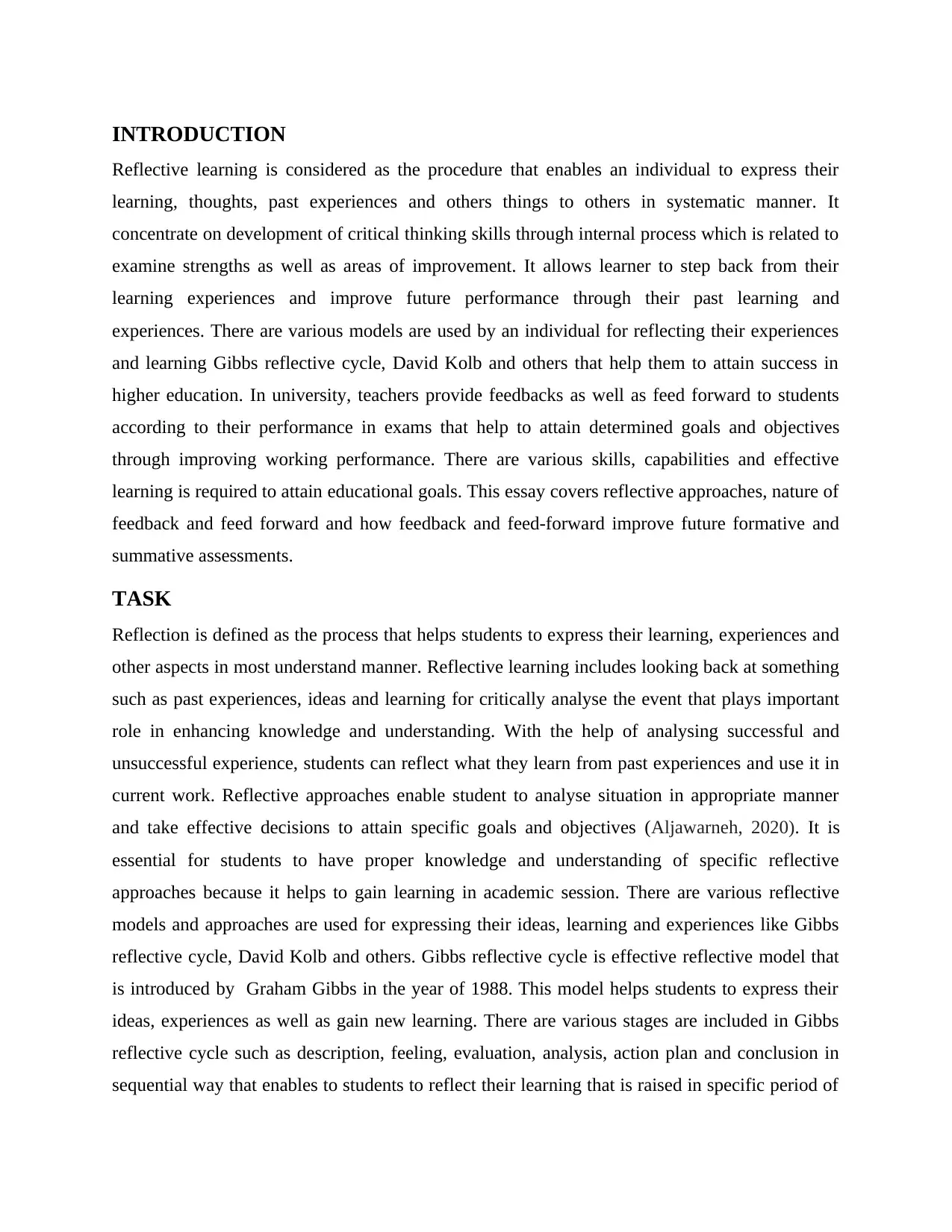
INTRODUCTION
Reflective learning is considered as the procedure that enables an individual to express their
learning, thoughts, past experiences and others things to others in systematic manner. It
concentrate on development of critical thinking skills through internal process which is related to
examine strengths as well as areas of improvement. It allows learner to step back from their
learning experiences and improve future performance through their past learning and
experiences. There are various models are used by an individual for reflecting their experiences
and learning Gibbs reflective cycle, David Kolb and others that help them to attain success in
higher education. In university, teachers provide feedbacks as well as feed forward to students
according to their performance in exams that help to attain determined goals and objectives
through improving working performance. There are various skills, capabilities and effective
learning is required to attain educational goals. This essay covers reflective approaches, nature of
feedback and feed forward and how feedback and feed-forward improve future formative and
summative assessments.
TASK
Reflection is defined as the process that helps students to express their learning, experiences and
other aspects in most understand manner. Reflective learning includes looking back at something
such as past experiences, ideas and learning for critically analyse the event that plays important
role in enhancing knowledge and understanding. With the help of analysing successful and
unsuccessful experience, students can reflect what they learn from past experiences and use it in
current work. Reflective approaches enable student to analyse situation in appropriate manner
and take effective decisions to attain specific goals and objectives (Aljawarneh, 2020). It is
essential for students to have proper knowledge and understanding of specific reflective
approaches because it helps to gain learning in academic session. There are various reflective
models and approaches are used for expressing their ideas, learning and experiences like Gibbs
reflective cycle, David Kolb and others. Gibbs reflective cycle is effective reflective model that
is introduced by Graham Gibbs in the year of 1988. This model helps students to express their
ideas, experiences as well as gain new learning. There are various stages are included in Gibbs
reflective cycle such as description, feeling, evaluation, analysis, action plan and conclusion in
sequential way that enables to students to reflect their learning that is raised in specific period of
Reflective learning is considered as the procedure that enables an individual to express their
learning, thoughts, past experiences and others things to others in systematic manner. It
concentrate on development of critical thinking skills through internal process which is related to
examine strengths as well as areas of improvement. It allows learner to step back from their
learning experiences and improve future performance through their past learning and
experiences. There are various models are used by an individual for reflecting their experiences
and learning Gibbs reflective cycle, David Kolb and others that help them to attain success in
higher education. In university, teachers provide feedbacks as well as feed forward to students
according to their performance in exams that help to attain determined goals and objectives
through improving working performance. There are various skills, capabilities and effective
learning is required to attain educational goals. This essay covers reflective approaches, nature of
feedback and feed forward and how feedback and feed-forward improve future formative and
summative assessments.
TASK
Reflection is defined as the process that helps students to express their learning, experiences and
other aspects in most understand manner. Reflective learning includes looking back at something
such as past experiences, ideas and learning for critically analyse the event that plays important
role in enhancing knowledge and understanding. With the help of analysing successful and
unsuccessful experience, students can reflect what they learn from past experiences and use it in
current work. Reflective approaches enable student to analyse situation in appropriate manner
and take effective decisions to attain specific goals and objectives (Aljawarneh, 2020). It is
essential for students to have proper knowledge and understanding of specific reflective
approaches because it helps to gain learning in academic session. There are various reflective
models and approaches are used for expressing their ideas, learning and experiences like Gibbs
reflective cycle, David Kolb and others. Gibbs reflective cycle is effective reflective model that
is introduced by Graham Gibbs in the year of 1988. This model helps students to express their
ideas, experiences as well as gain new learning. There are various stages are included in Gibbs
reflective cycle such as description, feeling, evaluation, analysis, action plan and conclusion in
sequential way that enables to students to reflect their learning that is raised in specific period of
⊘ This is a preview!⊘
Do you want full access?
Subscribe today to unlock all pages.

Trusted by 1+ million students worldwide
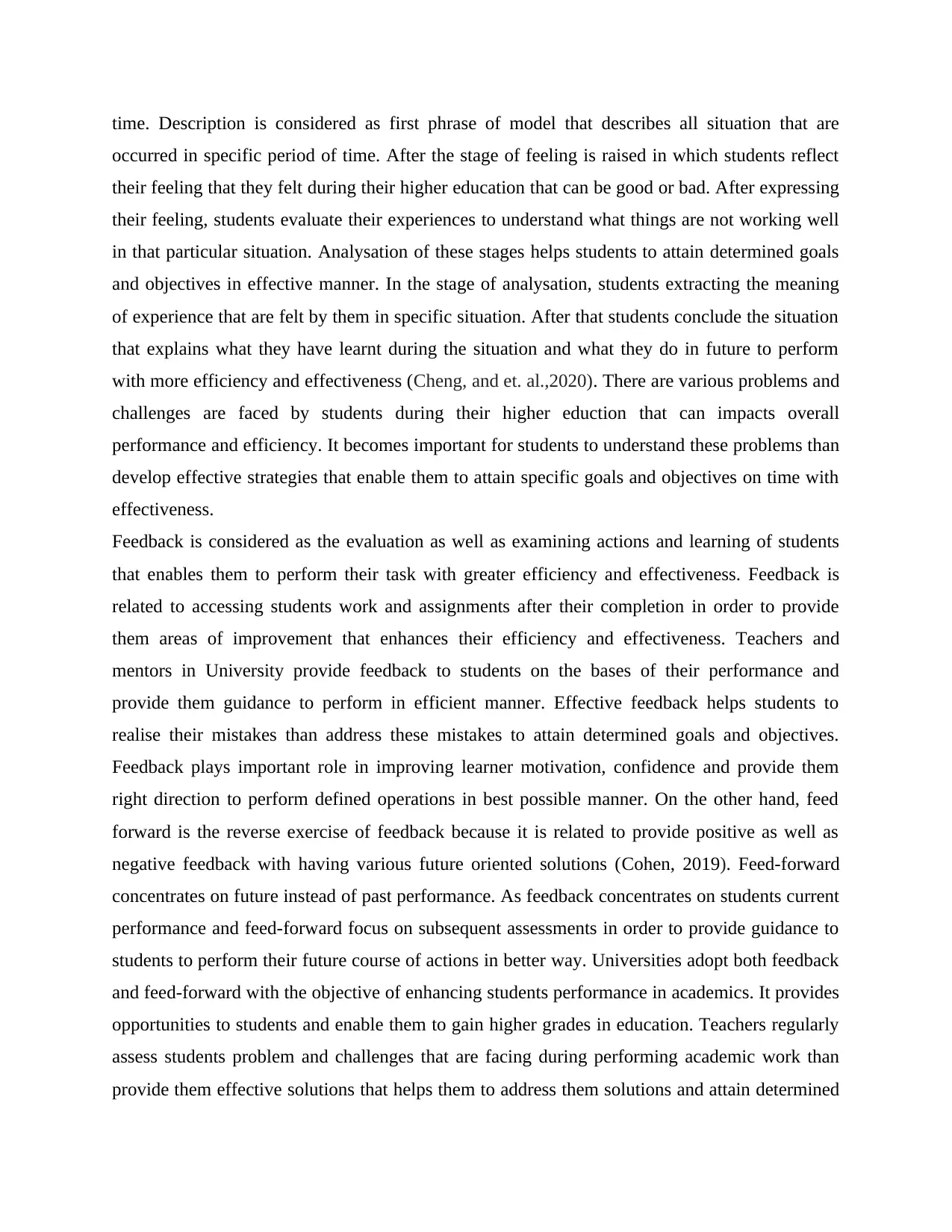
time. Description is considered as first phrase of model that describes all situation that are
occurred in specific period of time. After the stage of feeling is raised in which students reflect
their feeling that they felt during their higher education that can be good or bad. After expressing
their feeling, students evaluate their experiences to understand what things are not working well
in that particular situation. Analysation of these stages helps students to attain determined goals
and objectives in effective manner. In the stage of analysation, students extracting the meaning
of experience that are felt by them in specific situation. After that students conclude the situation
that explains what they have learnt during the situation and what they do in future to perform
with more efficiency and effectiveness (Cheng, and et. al.,2020). There are various problems and
challenges are faced by students during their higher eduction that can impacts overall
performance and efficiency. It becomes important for students to understand these problems than
develop effective strategies that enable them to attain specific goals and objectives on time with
effectiveness.
Feedback is considered as the evaluation as well as examining actions and learning of students
that enables them to perform their task with greater efficiency and effectiveness. Feedback is
related to accessing students work and assignments after their completion in order to provide
them areas of improvement that enhances their efficiency and effectiveness. Teachers and
mentors in University provide feedback to students on the bases of their performance and
provide them guidance to perform in efficient manner. Effective feedback helps students to
realise their mistakes than address these mistakes to attain determined goals and objectives.
Feedback plays important role in improving learner motivation, confidence and provide them
right direction to perform defined operations in best possible manner. On the other hand, feed
forward is the reverse exercise of feedback because it is related to provide positive as well as
negative feedback with having various future oriented solutions (Cohen, 2019). Feed-forward
concentrates on future instead of past performance. As feedback concentrates on students current
performance and feed-forward focus on subsequent assessments in order to provide guidance to
students to perform their future course of actions in better way. Universities adopt both feedback
and feed-forward with the objective of enhancing students performance in academics. It provides
opportunities to students and enable them to gain higher grades in education. Teachers regularly
assess students problem and challenges that are facing during performing academic work than
provide them effective solutions that helps them to address them solutions and attain determined
occurred in specific period of time. After the stage of feeling is raised in which students reflect
their feeling that they felt during their higher education that can be good or bad. After expressing
their feeling, students evaluate their experiences to understand what things are not working well
in that particular situation. Analysation of these stages helps students to attain determined goals
and objectives in effective manner. In the stage of analysation, students extracting the meaning
of experience that are felt by them in specific situation. After that students conclude the situation
that explains what they have learnt during the situation and what they do in future to perform
with more efficiency and effectiveness (Cheng, and et. al.,2020). There are various problems and
challenges are faced by students during their higher eduction that can impacts overall
performance and efficiency. It becomes important for students to understand these problems than
develop effective strategies that enable them to attain specific goals and objectives on time with
effectiveness.
Feedback is considered as the evaluation as well as examining actions and learning of students
that enables them to perform their task with greater efficiency and effectiveness. Feedback is
related to accessing students work and assignments after their completion in order to provide
them areas of improvement that enhances their efficiency and effectiveness. Teachers and
mentors in University provide feedback to students on the bases of their performance and
provide them guidance to perform in efficient manner. Effective feedback helps students to
realise their mistakes than address these mistakes to attain determined goals and objectives.
Feedback plays important role in improving learner motivation, confidence and provide them
right direction to perform defined operations in best possible manner. On the other hand, feed
forward is the reverse exercise of feedback because it is related to provide positive as well as
negative feedback with having various future oriented solutions (Cohen, 2019). Feed-forward
concentrates on future instead of past performance. As feedback concentrates on students current
performance and feed-forward focus on subsequent assessments in order to provide guidance to
students to perform their future course of actions in better way. Universities adopt both feedback
and feed-forward with the objective of enhancing students performance in academics. It provides
opportunities to students and enable them to gain higher grades in education. Teachers regularly
assess students problem and challenges that are facing during performing academic work than
provide them effective solutions that helps them to address them solutions and attain determined
Paraphrase This Document
Need a fresh take? Get an instant paraphrase of this document with our AI Paraphraser
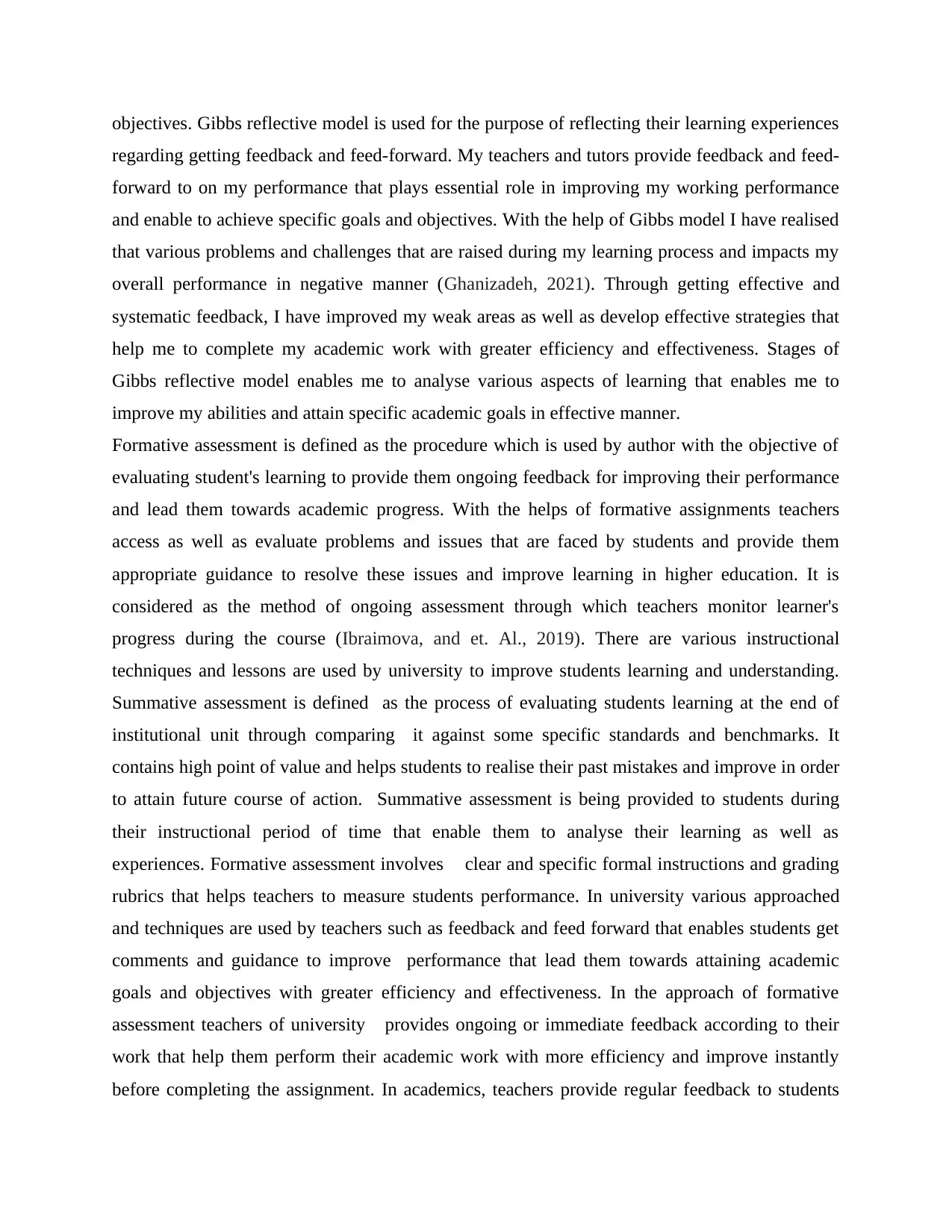
objectives. Gibbs reflective model is used for the purpose of reflecting their learning experiences
regarding getting feedback and feed-forward. My teachers and tutors provide feedback and feed-
forward to on my performance that plays essential role in improving my working performance
and enable to achieve specific goals and objectives. With the help of Gibbs model I have realised
that various problems and challenges that are raised during my learning process and impacts my
overall performance in negative manner (Ghanizadeh, 2021). Through getting effective and
systematic feedback, I have improved my weak areas as well as develop effective strategies that
help me to complete my academic work with greater efficiency and effectiveness. Stages of
Gibbs reflective model enables me to analyse various aspects of learning that enables me to
improve my abilities and attain specific academic goals in effective manner.
Formative assessment is defined as the procedure which is used by author with the objective of
evaluating student's learning to provide them ongoing feedback for improving their performance
and lead them towards academic progress. With the helps of formative assignments teachers
access as well as evaluate problems and issues that are faced by students and provide them
appropriate guidance to resolve these issues and improve learning in higher education. It is
considered as the method of ongoing assessment through which teachers monitor learner's
progress during the course (Ibraimova, and et. Al., 2019). There are various instructional
techniques and lessons are used by university to improve students learning and understanding.
Summative assessment is defined as the process of evaluating students learning at the end of
institutional unit through comparing it against some specific standards and benchmarks. It
contains high point of value and helps students to realise their past mistakes and improve in order
to attain future course of action. Summative assessment is being provided to students during
their instructional period of time that enable them to analyse their learning as well as
experiences. Formative assessment involves clear and specific formal instructions and grading
rubrics that helps teachers to measure students performance. In university various approached
and techniques are used by teachers such as feedback and feed forward that enables students get
comments and guidance to improve performance that lead them towards attaining academic
goals and objectives with greater efficiency and effectiveness. In the approach of formative
assessment teachers of university provides ongoing or immediate feedback according to their
work that help them perform their academic work with more efficiency and improve instantly
before completing the assignment. In academics, teachers provide regular feedback to students
regarding getting feedback and feed-forward. My teachers and tutors provide feedback and feed-
forward to on my performance that plays essential role in improving my working performance
and enable to achieve specific goals and objectives. With the help of Gibbs model I have realised
that various problems and challenges that are raised during my learning process and impacts my
overall performance in negative manner (Ghanizadeh, 2021). Through getting effective and
systematic feedback, I have improved my weak areas as well as develop effective strategies that
help me to complete my academic work with greater efficiency and effectiveness. Stages of
Gibbs reflective model enables me to analyse various aspects of learning that enables me to
improve my abilities and attain specific academic goals in effective manner.
Formative assessment is defined as the procedure which is used by author with the objective of
evaluating student's learning to provide them ongoing feedback for improving their performance
and lead them towards academic progress. With the helps of formative assignments teachers
access as well as evaluate problems and issues that are faced by students and provide them
appropriate guidance to resolve these issues and improve learning in higher education. It is
considered as the method of ongoing assessment through which teachers monitor learner's
progress during the course (Ibraimova, and et. Al., 2019). There are various instructional
techniques and lessons are used by university to improve students learning and understanding.
Summative assessment is defined as the process of evaluating students learning at the end of
institutional unit through comparing it against some specific standards and benchmarks. It
contains high point of value and helps students to realise their past mistakes and improve in order
to attain future course of action. Summative assessment is being provided to students during
their instructional period of time that enable them to analyse their learning as well as
experiences. Formative assessment involves clear and specific formal instructions and grading
rubrics that helps teachers to measure students performance. In university various approached
and techniques are used by teachers such as feedback and feed forward that enables students get
comments and guidance to improve performance that lead them towards attaining academic
goals and objectives with greater efficiency and effectiveness. In the approach of formative
assessment teachers of university provides ongoing or immediate feedback according to their
work that help them perform their academic work with more efficiency and improve instantly
before completing the assignment. In academics, teachers provide regular feedback to students
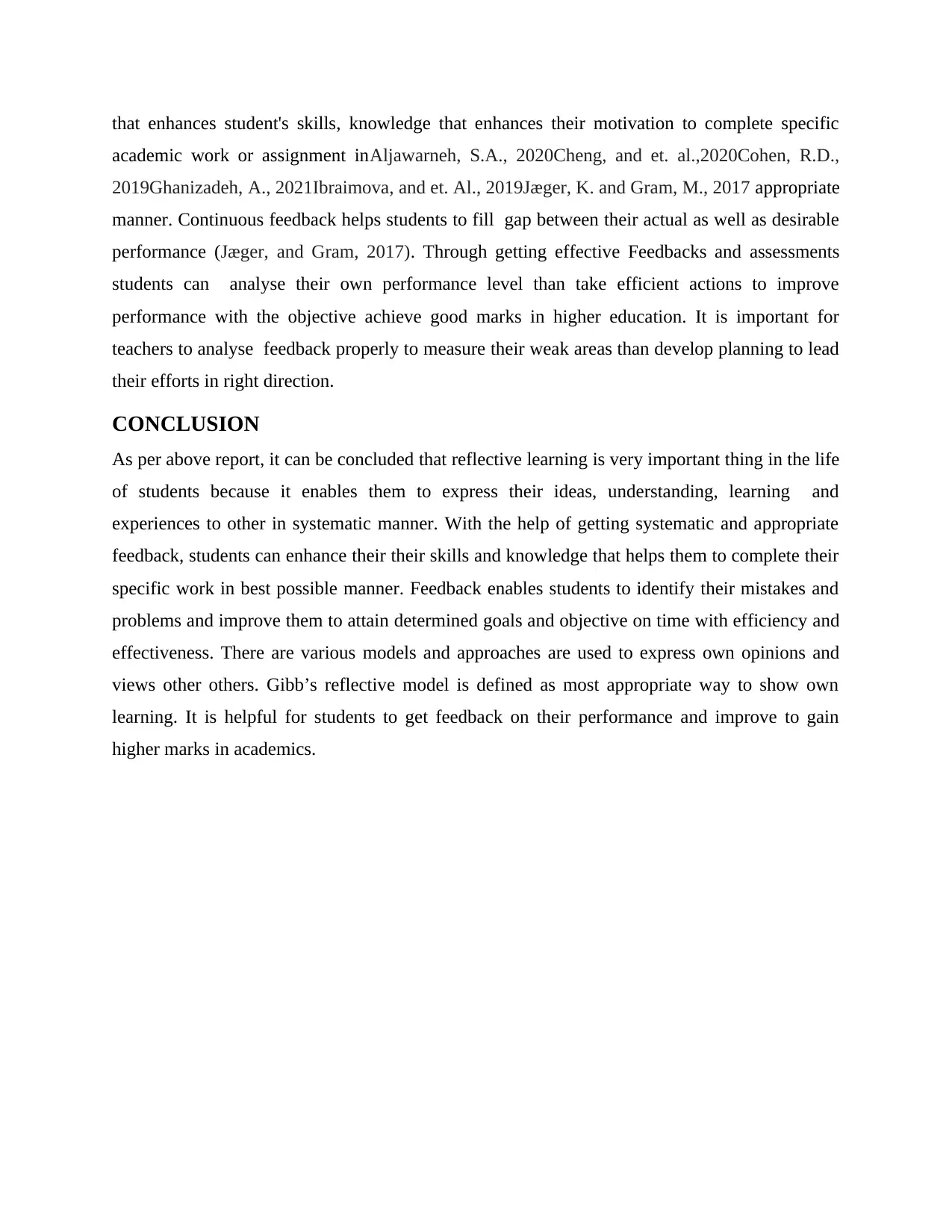
that enhances student's skills, knowledge that enhances their motivation to complete specific
academic work or assignment inAljawarneh, S.A., 2020Cheng, and et. al.,2020Cohen, R.D.,
2019Ghanizadeh, A., 2021Ibraimova, and et. Al., 2019Jæger, K. and Gram, M., 2017 appropriate
manner. Continuous feedback helps students to fill gap between their actual as well as desirable
performance (Jæger, and Gram, 2017). Through getting effective Feedbacks and assessments
students can analyse their own performance level than take efficient actions to improve
performance with the objective achieve good marks in higher education. It is important for
teachers to analyse feedback properly to measure their weak areas than develop planning to lead
their efforts in right direction.
CONCLUSION
As per above report, it can be concluded that reflective learning is very important thing in the life
of students because it enables them to express their ideas, understanding, learning and
experiences to other in systematic manner. With the help of getting systematic and appropriate
feedback, students can enhance their their skills and knowledge that helps them to complete their
specific work in best possible manner. Feedback enables students to identify their mistakes and
problems and improve them to attain determined goals and objective on time with efficiency and
effectiveness. There are various models and approaches are used to express own opinions and
views other others. Gibb’s reflective model is defined as most appropriate way to show own
learning. It is helpful for students to get feedback on their performance and improve to gain
higher marks in academics.
academic work or assignment inAljawarneh, S.A., 2020Cheng, and et. al.,2020Cohen, R.D.,
2019Ghanizadeh, A., 2021Ibraimova, and et. Al., 2019Jæger, K. and Gram, M., 2017 appropriate
manner. Continuous feedback helps students to fill gap between their actual as well as desirable
performance (Jæger, and Gram, 2017). Through getting effective Feedbacks and assessments
students can analyse their own performance level than take efficient actions to improve
performance with the objective achieve good marks in higher education. It is important for
teachers to analyse feedback properly to measure their weak areas than develop planning to lead
their efforts in right direction.
CONCLUSION
As per above report, it can be concluded that reflective learning is very important thing in the life
of students because it enables them to express their ideas, understanding, learning and
experiences to other in systematic manner. With the help of getting systematic and appropriate
feedback, students can enhance their their skills and knowledge that helps them to complete their
specific work in best possible manner. Feedback enables students to identify their mistakes and
problems and improve them to attain determined goals and objective on time with efficiency and
effectiveness. There are various models and approaches are used to express own opinions and
views other others. Gibb’s reflective model is defined as most appropriate way to show own
learning. It is helpful for students to get feedback on their performance and improve to gain
higher marks in academics.
⊘ This is a preview!⊘
Do you want full access?
Subscribe today to unlock all pages.

Trusted by 1+ million students worldwide
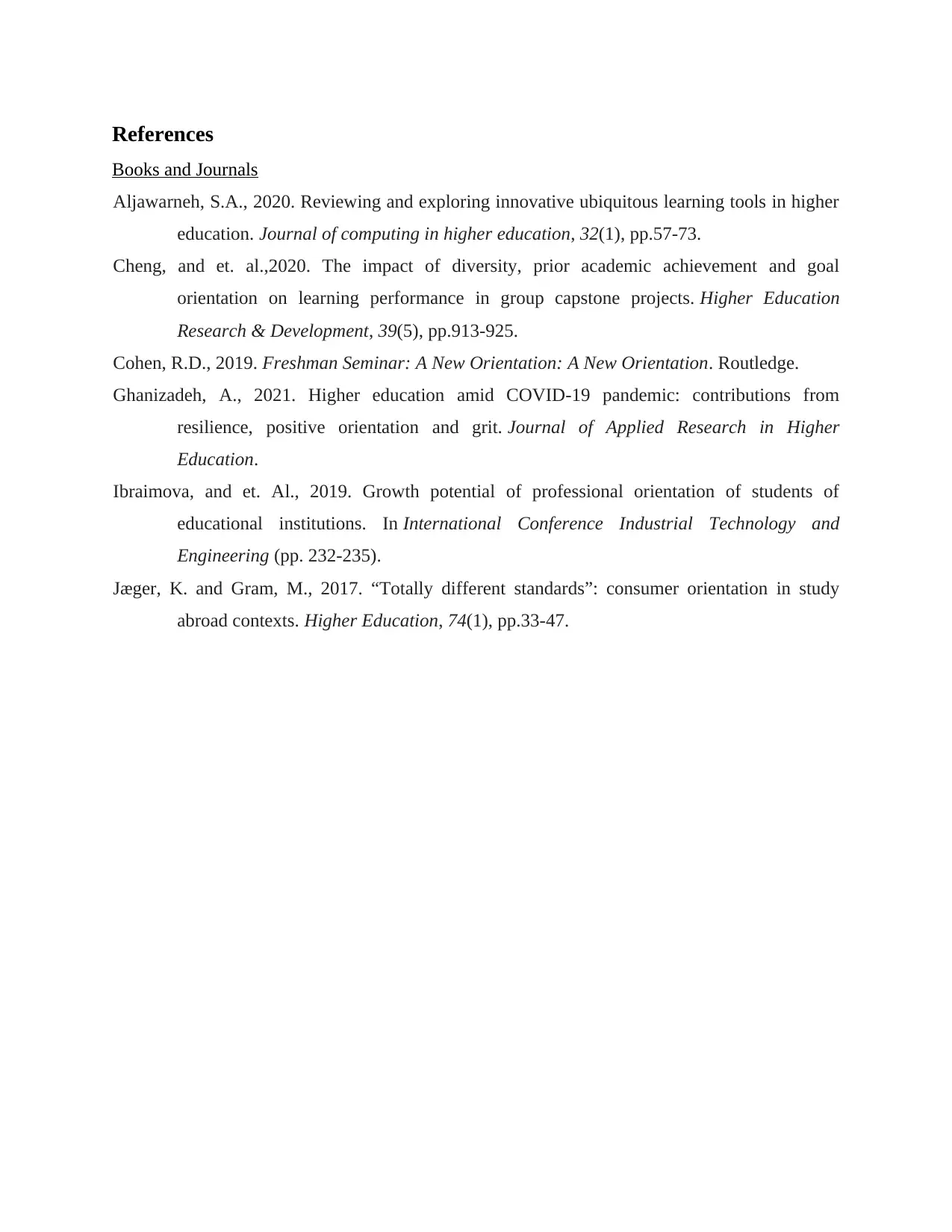
References
Books and Journals
Aljawarneh, S.A., 2020. Reviewing and exploring innovative ubiquitous learning tools in higher
education. Journal of computing in higher education, 32(1), pp.57-73.
Cheng, and et. al.,2020. The impact of diversity, prior academic achievement and goal
orientation on learning performance in group capstone projects. Higher Education
Research & Development, 39(5), pp.913-925.
Cohen, R.D., 2019. Freshman Seminar: A New Orientation: A New Orientation. Routledge.
Ghanizadeh, A., 2021. Higher education amid COVID-19 pandemic: contributions from
resilience, positive orientation and grit. Journal of Applied Research in Higher
Education.
Ibraimova, and et. Al., 2019. Growth potential of professional orientation of students of
educational institutions. In International Conference Industrial Technology and
Engineering (pp. 232-235).
Jæger, K. and Gram, M., 2017. “Totally different standards”: consumer orientation in study
abroad contexts. Higher Education, 74(1), pp.33-47.
Books and Journals
Aljawarneh, S.A., 2020. Reviewing and exploring innovative ubiquitous learning tools in higher
education. Journal of computing in higher education, 32(1), pp.57-73.
Cheng, and et. al.,2020. The impact of diversity, prior academic achievement and goal
orientation on learning performance in group capstone projects. Higher Education
Research & Development, 39(5), pp.913-925.
Cohen, R.D., 2019. Freshman Seminar: A New Orientation: A New Orientation. Routledge.
Ghanizadeh, A., 2021. Higher education amid COVID-19 pandemic: contributions from
resilience, positive orientation and grit. Journal of Applied Research in Higher
Education.
Ibraimova, and et. Al., 2019. Growth potential of professional orientation of students of
educational institutions. In International Conference Industrial Technology and
Engineering (pp. 232-235).
Jæger, K. and Gram, M., 2017. “Totally different standards”: consumer orientation in study
abroad contexts. Higher Education, 74(1), pp.33-47.
Paraphrase This Document
Need a fresh take? Get an instant paraphrase of this document with our AI Paraphraser

1 out of 8
Related Documents
Your All-in-One AI-Powered Toolkit for Academic Success.
+13062052269
info@desklib.com
Available 24*7 on WhatsApp / Email
![[object Object]](/_next/static/media/star-bottom.7253800d.svg)
Unlock your academic potential
Copyright © 2020–2026 A2Z Services. All Rights Reserved. Developed and managed by ZUCOL.
